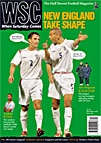 Fergie very nearly lost his job before any of his league titles. But as Ashley Shaw informs us, he was saved by the Palace
Fergie very nearly lost his job before any of his league titles. But as Ashley Shaw informs us, he was saved by the Palace
Let’s hope Sir Alex Ferguson enjoys his 20th anniversary a good deal more than his third. Back in 1989 the knives were out after an horrific start to the season, which included a notorious derby defeat and an early exit to Spurs in the League Cup.
United were playing dreadful football before ever-dwindling attendances and during a 2‑1 home defeat to Crystal Palace in December, Stretford End diehards unfurled the infamous banner, “Three years of excuses and we’re still crap – Ta-ra Fergie” – the die appeared to have been cast. In the intervening years Ferguson has had to deal with many crises, but none have rendered him as powerless as the day the hardcore support openly called for his head.
Part of the crowd’s frustration lay with the board. Chairman Martin Edwards’ failed attempt to sell the club to Michael Knighton, the ball-juggling businessman who later had such a strange time at Carlisle, had made United a laughing stock and highlighted the meagre funds available to the manager. Even so, most agreed that the manager had squandered what little money there was. The acquisition of former Dundee United winger Ralph Milne in November 1988 turned Fergie’s transfer dealings into a bad joke.
By 1989 five United managers had failed the main brief of the job. Ferguson knew when he took over that, in his own words, he had to “knock Liverpool off their fucking perch”, yet three seasons in, his targets looked as imperious as ever while United floundered in mid-table. No one in that meagre 33,514 crowd would have entertained the notion that eight of Fergie’s flounderers against Palace would go on to win the title three seasons later. Yet Mark Robins’ famous Cup-tie winner a month later at the City Ground turned the tide and Ferguson rode his luck all the way to Wembley and beyond.
By the late Eighties United were a distant second to Liverpool in all departments, with Anfield’s crowds dwarfing Old Trafford’s. “The heart is fading from this once great club,” a concerned Michael Crick wrote in Betrayal of a Legend, a book that revealed that Martin Edwards took a percentage of transfer funds received and highlighted how far United had fallen behind not only Liverpool but Everton and Rangers in the football rich list.
Crucially, this period was briefly illuminated in early 1989 with a 3-1 defeat of Liverpool followed by a heart-warming FA Cup run that brought capacity crowds back to Old Trafford. The terrace heroes this time were youngsters promoted from the A and B teams following a spate of first team injuries. Russell Beardsmore, Tony Gill and Deiniol Graham shone brightly, reminding older supporters of the arrival of Viollet, Edwards et al 35 years before. As it turned out these new youngsters didn’t make it, but they provided evidence of Ferguson’s awareness of United tradition.
Yet by Christmas that year he was braced for the inevitable as an eight-game winless streak presaged United’s third-round FA Cup tie at Nottingham Forest. It was inconceivable that Ferguson wouldn’t succumb to the same pressures as Sexton, Atkinson and the rest. That he didn’t was more than likely down to that youthful flurry of early 1989. Despite being characterised as a keen rugby fan, Martin Edwards had seen his first United game in 1952 and regularly accompanied his father, the club’s former chairman, Louis, to watch the nascent Busby’s Babes from the directors’ box. The memory of those players no doubt returned when he witnessed Beardsmore tear Liverpool apart on New Year’s Day 1989.
By May 1990 United were Cup winners. The next two seasons saw the emergence of Ryan Giggs and Lee Sharpe, adding speed to the desire of Paul Ince and Bryan Robson while Steve Bruce and Gary Pallister developed into a more than reliable defensive partnership. And Liverpool swapped Dalglish for Souness and Hansen and Lawrenson for a succession of uncertain Scandinavians. The swagger that arrived with the signings of Peter Schmeichel and Eric Cantona ended any lingering doubts about Ferguson’s being Sir Matt Busby’s rightful heir.
Seventeen years later it appears that the United manager has come full circle. There remains a vocal minority that wants to oust Ferguson in the belief that his recent dealings with the Glazers and his comparatively modest recent record are a sign of waning powers. Yet whatever happens now, there will never be a crisis as grave as December 1989, when complete failure seemed only a moment away.
From WSC 238 December 2006. What was happening this month